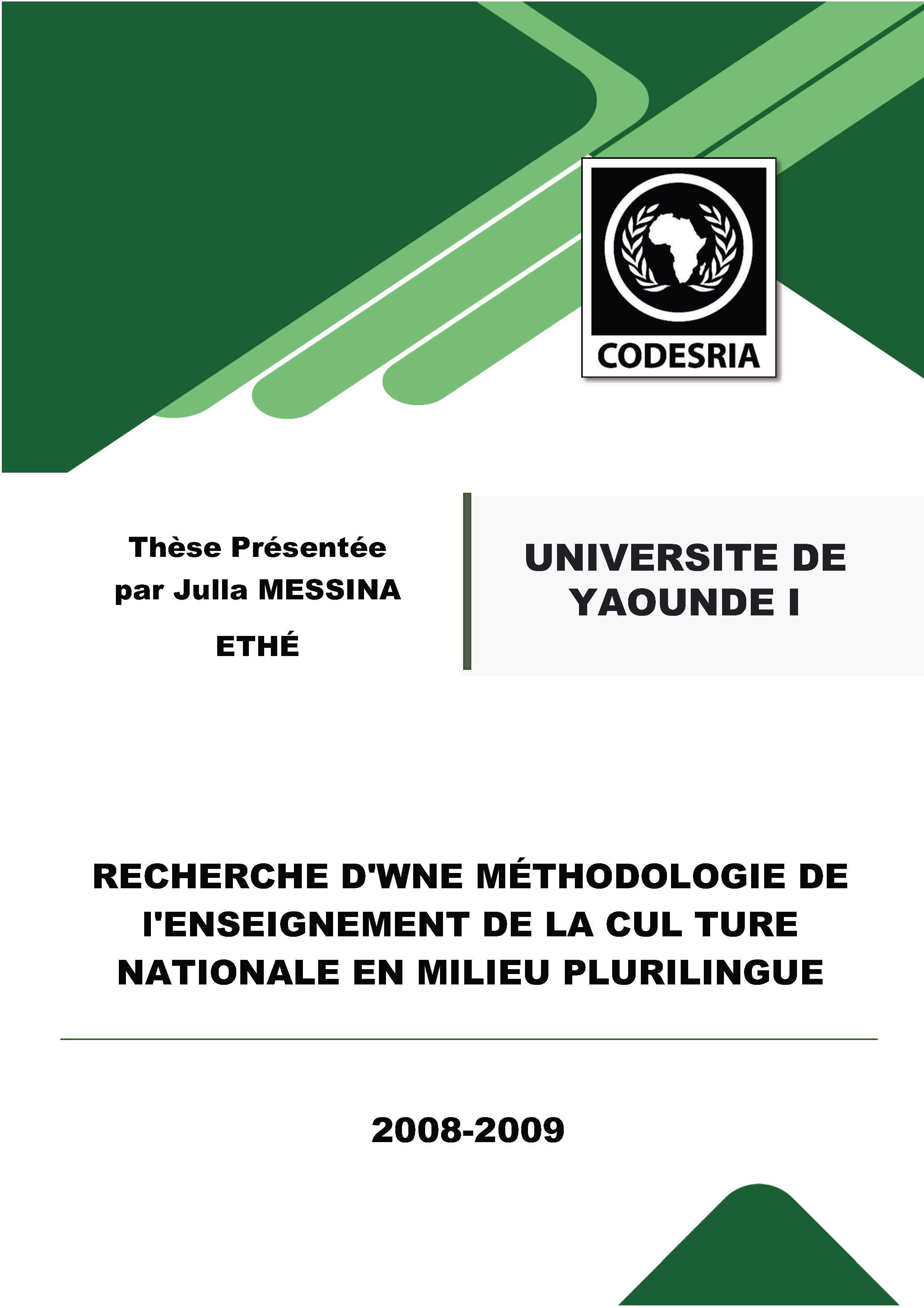RECHERCHE D'UNE MÉTHODOLOGIE DE l'ENSEIGNEMENT DE LA CUL TURE NATIONALE EN MILIEU PLURILINGUE
Keywords:
Recherche, MÉTHODOLOGIE, ENSEIGNEMENT, culture, MILIEU PLURILINGUESynopsis
Our work titled "Recherche d'une méthodologie de l'enseignement de la culture nationale en milieu plurilingue" (the search for a teaching methodology of national culture in a multilingual setting) presents the results of an experimentation of the teaching of national cultures to pupils studying in a multilingual context. From observations based on a series of surveys, our study examines and strives propose solutions to problems relating to the absence of teaching national culture in a multilingual settings since 2002.
The objectives we set for ourselves are the evaluation, validation of methods and approaches put in place by MINEDUB and some researchers on the one hand and us on the other, the harmonization of syllabuses, the contents and didactic approaches of French-speaking and English-speaking education systems, proposal for a national culture teaching methodology, the production of national culture bilingual/multilingual didactic material and the teaching of national languages in primary schools through national culture in a multilingual setting.
Our theoretical framework is based on cultural adjustment, sociolinguistics and the didactics of cultures. The instruments of research used are direct observation done in classrooms of primary schools of Yaounde and Douala, questionnaires addressed to parents, school teachers and pupils of the towns of Douala and Yaounde and evaluation tests. Our research took place in five phases namely, the global evaluation of the situation, the contexts of language usage, the environment and cultural and linguistics attitudes and aptitudes that have an impact on pupils, field survey, experiments, the preparation of teaching aids and evaluation, validation and conclusions.
At the end of our survey, we propose the contents of the national culture which comprise seventeen cultural elements.
These contents are taught on the basis of two approaches.
The first approach consists of the following stages: waking up,. revision, introduction of the lesson, the lesson proper, transfer, evaluation and homework. The second consist of revision, discovery, anatysis, confrontation, translation and evaluation. Ali the two approaches give priority or importance to the us·e of national languages associated with that of the official languages.
The didactic material consists of five textbooks, one for the nursery school, one for the first year in primary school, one for the second year in primary school, one for the third year in primary school, and lastly one for the fourth and fifth years in primary
school. The books on national culture are divided into tapies, chapters and lessons. Each lesson contains activities which the teacher will teach after having explained the cultural elements concerned. The teacher can quite simply be inspired by them
and carry out activities from those proposed in the textbooks. Seminars for the training of trainers and teachers enabled the evaluation and validation of ail the material proposed to schools by teachers. They also enabled a more widespread introduction of the teaching of national culture. To date, national culture is being taught in the whole Mfoundi Division, represented in the seminar, following the methodology proposed in this thesis.
ln the proposais, we suggested to the Govemment that national culture be integrated as a subject in the FSLC syllabus and the appointment of National Culture Pedagogic lnspectors of Sub-divisions and Divisions. To the parents, we recommend the grooming or drilling of children, when they are still very young, in their culture and their national language and the content of the teaching of the culture in the national language; to teachers, collage and high school teachers and higher education lecturers, collaboration for the promotion and dissemination of national cultures is recommended; to other promoters, we are calling upon them to invest effectively in an the aspects of culture following the example of summer school, national culture contests and many others.
Downloads
References
Abou S. 1988, Fondements des politiques linguistiques, in Actes du Premier Congrès de l'Institut International de Droit Linguistique Comparé, du 27-29 avril 1988, Langue et Droit, Université du Québec, Montréal, pp 21-33.
Bearth, T. 1996 (éd.), Langues et éducation en Afrique Noire, Travaux Neuchâtelois de linguistique (TRANEL), n° 26, Suisse, Université de Neuchâtel, 119p.
Bella Essengue, A. 1992, Les langues nationales dans les stations provinciales de la CRTV. : le cas de la langue ewondo, Dissertation for Diploma in Journalism, Advanced School of Mass Communication, University of Yaounde 1.
Bitjaa Kody, Z.D. 2000, « Attitudes linguistiques et intégration socio-économique des Africains francophones à Montréal », in AJAL (African Journal of African Languages), N° 1, CLA, Yaoundé, pp. 58-82.
Udo Bucie, 1985, Culture et environnement dans l'enseignement primaire : exigences du programme et pratique dans les écoles d'Afrique subsaharienne, in Centre de l'Education de la Science et de la documentation zentralstelle für Erziehung, issenschaft und Dokumentation. Bonn. Allemagne.
Wadhaugh R. 1986. Introduction ta sociolinguistics, Oxford.
www.cameroon-link.com
www.interculture.ca/cil-cai/country_information.fr
www.onelitlleangel.com/sagesse/religion/christianisme.asp.
www.wikipédia.org
wikipédia.org/wiki (liste_de_films_en_wolof_29k_)






